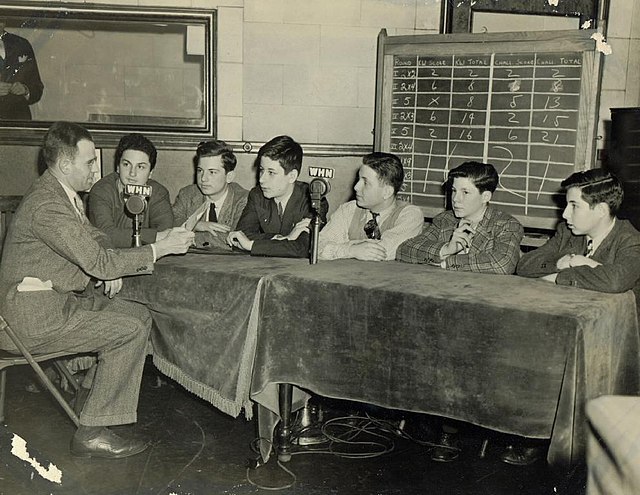Pyramid is an American game show franchise that has aired several versions domestically and internationally. The show was developed by Bob Stewart. The original series, The $10,000 Pyramid, debuted on March 26, 1973, and spawned seven subsequent Pyramid series. Most later series featured a full title format matching the original series, with the title reflecting an increasing top prize. The game features two contestants, each paired with a celebrity. In the game, the contestants and celebrities attempt to identify words or phrases through clues given by their teammates. The title refers to the show's pyramid-shaped gameboard, featuring six categories arranged in a triangular fashion. The various Pyramid series have won a total of nine Daytime Emmys for Outstanding Game Show, second only to Jeopardy!, which has won 13.
Charles Siebert uses pantomime to describe "lasso" on The $25,000 Pyramid in 1982.
A contestant gives clues to Kathy Najimy in the Winner's Circle on The $100,000 Pyramid in 2016.
Dick Clark (age 44) as host of The $10,000 Pyramid (1974).
Title card of the 1980s (New) $25,000 Pyramid.
A game show is a genre of broadcast viewing entertainment where contestants compete for rewards. The shows are typically directed by a host, who explains the rules of the game as well as commentating and narrating where necessary. The history of the game shows dates back to the late 1930s when both radio and television game shows were broadcast. The genre became popular in the United States in the 1950s, becoming a regular feature of daytime television.
United States Armed Forces participate in Wheel of Fortune with Pat Sajak.
1938 radio quiz show Whiz Kids on WHN Radio in New York
Note For Note, a New Zealand game show from around 1960
Tupla tai kuitti (1958–1988), a Finnish game show with show host Kirsti Rautiainen (left) and competitor Markku Kivekäs (right) in 1965.








